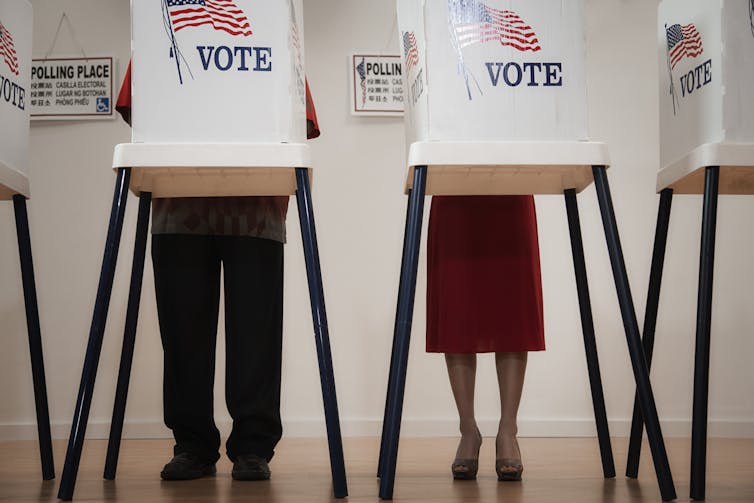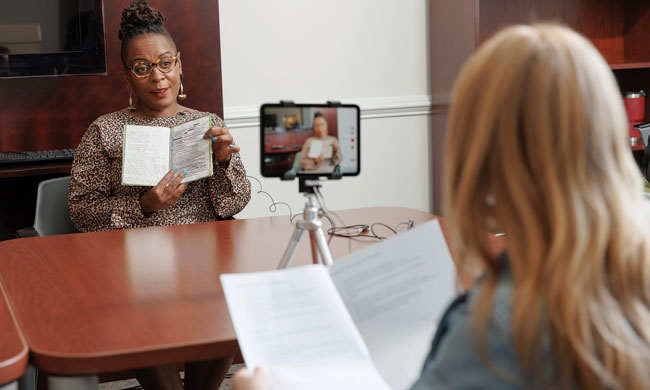Pages
- Home
- North Alabama
- Central Alabama
- South Alabama
- East Alabama
- West Alabama
- FEATURE BUSINESS
- Business Directory
- The Cumberland Mall
- Career
- COOL STUFF
- Culture & Arts
- DEALS!
- Economy
- Education
- Environment
- Food
- Health
- Our Farmers
- Politics
- Real Estate
- Science
- Tech
- Travel
- Democratic Party
- Local Democratic Party
- Republican Party
- Local Republican Party
Tuesday, February 27, 2024
Higher Education Day at the Capitol
Sunday, February 25, 2024
March 5th Amendment
by Prince Cleveland
Back when I was younger, I was a slightly uninformed voter.
Not about candidates, I always knew who I would vote for. But a lot of times I was uninformed about proposed amendments to the Alabama Constitution. I would read the legal jargon on the fly in the voting booth, hoping I understood clearly enough to make the wisest decision. If I wasn’t confident in my understanding, a no vote would be my default.
After family and friends asked for my opinion on the amendments, I decided the time had come to break the cycle and educate myself in the same way I would educate myself on candidates I would vote for.
So, every election I make a point to have a better understanding of what I’m voting for… and against.
On March 5th, Alabamians will vote for party nominees for office and an amendment to the Alabama Constitution that will change the way the Alabama Legislature considers certain legislation it will vote on.
The Alabama House of Representatives and Senate’s single constitutional duty is to pass the state budgets, the General Fund and the Education Trust Fund. The legislature also passes numerous bills that are not budget related and of major public interest… usually.
Currently, the legislature cannot consider bills until the budgets are passed and sent to the governor, unless 3/5 of the legislature allows consideration of those bills. In essence, those non-budget related bills must clear a threshold of 60% just to bring legislation to the floor for debate and final passage.
Some legislators have said that those votes rarely fail, and non-budget related legislation is considered after such votes of 3/5 of the legislature.
A YES vote on March 5th will allow for local bills and local proposed constitutional amendments to be considered by the legislature, even if the state budgets have not been passed. Other non-local legislation would still require a 3/5 vote of the legislature to be considered before the budgets are passed.
A NO vote would maintain the status quo. All bills would still require a 3/5 vote in each house of the legislature to be considered before the state budgets are passed.
It seems benign enough to warrant a yes vote. If you are unsure, the default path I used to take could be an option, but I hope I have provided you with enough information to make a wise decision for yourself.
See you at the polls!
Monday, February 19, 2024
Celebrating Women Veterans: 5 meaningful ways to pay tribute
Veterans play an important role in U.S. history. Over time, the demographics of veterans have changed, but few realize the growing role of women in the armed forces. Today, women comprise 11% of the veteran population. According to the Pew Research Center, that number is expected to increase to 18% by 2048.
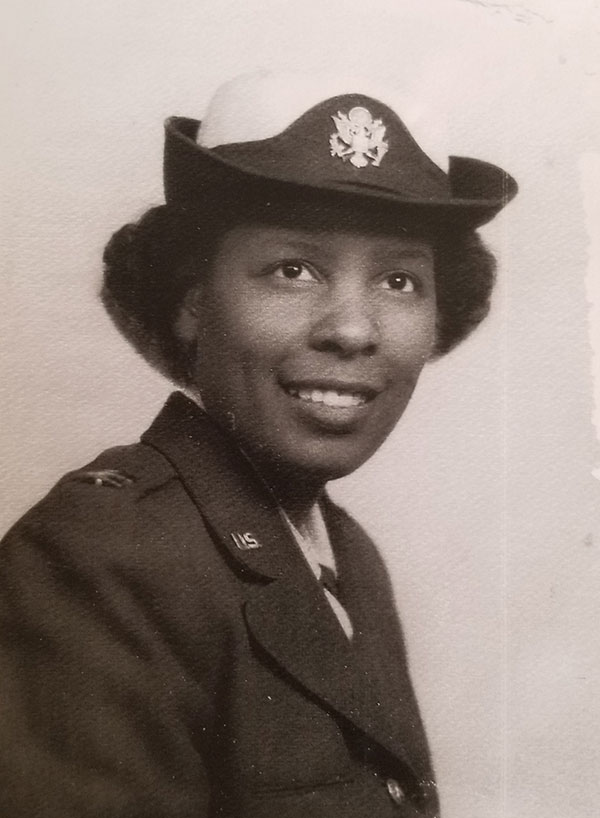 Fannie Griffin McClendon is one of those women. She enlisted during a tumultuous period of history that spanned World War II, the Korean War and the Vietnam War. Her more than two decades in the military included service in both the Army and Air Force.
Fannie Griffin McClendon is one of those women. She enlisted during a tumultuous period of history that spanned World War II, the Korean War and the Vietnam War. Her more than two decades in the military included service in both the Army and Air Force.
In an oral history interview for the Library of Congress Veterans History Project, she recalled her proudest memory was her time with the 6888th Central Postal Directory Battalion during World War II. As the only all-African American, all-female unit deployed to Europe, it processed mountains of mail for U.S. servicemembers in Europe in 1945 and is credited with boosting the troops’ morale. McClendon also provided a unique perspective of life as a career military officer in an era when African American women faced bigotry and barriers.
Through the Veterans History Project, the Library of Congress collects and preserves the firsthand remembrances of U.S. military veterans like McClendon and makes them accessible for future generations to better understand veterans’ service and sacrifice. Stories are available to the public on the Library’s website and at the Washington, D.C. campus.
You can extend this work and honor women veterans in your community with simple acts of appreciation such as:
Support Women Veteran-Owned Businesses
Take your support for small businesses one step further and look for women veteran-owned businesses to support. These leaders are making waves in the business world and the nonprofit sector. If possible, provide mentorships for women veterans to help transition to civilian life.
Encourage Women Veterans to Share Their Stories
Interview the women veterans in your life and capture the details of their military experiences. Then share your documentation with the Veterans History Project, which helps preserve these stories for future generations.
Submit a 30-minute (or longer) unedited video or audio interview sharing service details and/or a collection of original photos or correspondence. Veterans, or families of deceased veterans, may also submit a minimum 20-page journal and/or unpublished memoir or 10 or more original photos or letters. Visit loc.gov/vets and click “How to Participate” for instructions.
Learn More About Women Veterans
Educate yourself, your children and those around you. Visit museums and memorials, many of which have specific displays to honor the sacrifices and triumphs of women veterans.
Advocate for and Empower Women Veterans
Support initiatives and programs that serve women veterans. Empower them to acknowledge their service and take advantage of the programs and resources available.
Say ‘Thank You’
This may be the easiest, yet most impactful, way you can support veterans, and there are many ways to do so. Shake her hand, buy her lunch or send her a card or letter. None of these take much time, but each can have a big impact.
Photos courtesy of the Library of Congress Veterans History Project, Fannie Griffin McClendon Collection, AFC2001/001/119440 and Fannie Griffin McClendon.
Library of Congress Veterans History Project
Saturday, February 17, 2024
Two Democrats Vie in Commission Primary
Democrats in Shelby County’s District 7 County Commission race will have a choice on the March 5 primary ballot. In recent memory, few Dems have even qualified to run for County Commission. The present circumstance of two Democrats in competition for a spot on the general election ballot indicates the urgency felt by many in the Democratic Party to make their voices heard locally and nationally.
One
candidate is Marsha Sturdevant, MD, who served as a pediatrician, professor at
UAB School of Medicine, and Director of the Adolescent Clinic at Children’s
Hospital for decades. She now serves on
the Board of Directors of AIDS Alabama, is Central Regional Director of
Destination Imagination, member of Alabama Arise, Shelby NAACP, Friends of
North Shelby Library, Alabama River Alliance, and GASP, plus is Chair of the
Shelby County Democratic Party. Dr.
Sturdevant states, “I am running for the County Commission for the same reason
I became a doctor, to help people. I
want people in my district to count on me to listen to their concerns and to
work on solutions.”
Also running in the primary election is
Spencer Stone, PhD. Dr. Stone taught humanities
in high schools in Birmingham while attending graduate school at the University
of Alabama, where he also taught Educational Finance to undergrads. Now teaching at Thompson High School, he has
been head of the Computer Science Department for five years and coaches
award-winning teams in both robotics and E-Sports competitions. Dr. Stone believes that his educational
background, life experience, and passion to help struggling students and their
families will bring a needed voice to the County Commission.
For information about other Democrats who
have qualified to run for local and regional offices in the November general
election, see the Party’s website at www.shelbycountydems.com.
Saturday, February 10, 2024
Supreme Court skeptical that Colorado − or any state − should decide for whole nation whether Trump is eligible for presidency
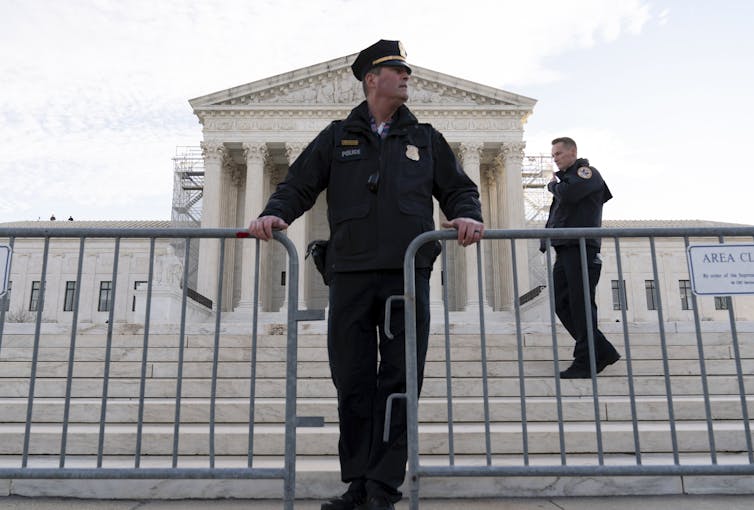
Both liberal and conservative justices weighed in during oral arguments before the U.S. Supreme Court on Feb. 8, 2024, asking questions concerning whether a constitutional provision, Section 3 of the 14th Amendment, gave states too much power to affect a national election.
Colorado’s highest court relied on the provision in a December 2023 ruling that the state could bar former President Donald Trump from the state’s primary ballot because they determined he committed insurrection.
“Why should a single state have the ability to make this determination, not only for their own citizens, but for the rest of the nation?” asked liberal Justice Elena Kagan on Feb. 8.
The Conversation’s senior politics and democracy editor, Naomi Schalit, spoke with Notre Dame election law scholar Derek Muller after the oral arguments.
Muller had submitted an amicus brief to the court “in support of neither party” in the case, using the opportunity to describe some concerns for the court’s consideration about whether and how states go about the business of judging qualifications of candidates before putting their names on the ballot.
What are your first impressions of the oral arguments?
The Supreme Court was very skeptical that, as an institution, it should be the one responsible for deciding this deeply contested question, and it seemed skeptical that the state of Colorado could do this on its own without some congressional guidance or authorization.
They recognized this as a contested political issue. And I think the concern that one state could effectively alter a national presidential election – without any sort of guidance from Congress or explanation at the federal level about how to go about doing that – was problematic.
The justices did not appear to be divided and partisan in their discussion of the case.
The notion that different states could have different standards for disqualifying presidential candidates, and that they would all come up to the Supreme Court to sort it out, was disturbing to them across the political spectrum. On the whole, they seemed inclined to reverse the Colorado Supreme Court.
Justice Brett Kavanaugh mentioned his concerns about states having such power over a national office. The Colorado solicitor general referred to the “messiness of federalism.” What does this mean?
States are the ones who have the primary responsibility of running presidential elections. And Colorado was leaning very heavily into this authority they have over which candidates to list on the ballot and how that can vary from state to state. The pushback from the Supreme Court in this case was to say, in essence, you’re not dealing with local or state interests, you’re not dealing with these state-specific procedures for how you list candidates on the ballot. You are interpreting a provision of the U.S. Constitution, and then you are applying it in your own state in a way that could affect what happens in other states.
The court did lean much more heavily into the notion that when you’re dealing with a national office, like the office of the presidency, and dealing with a nationwide issue, like Section 3 of the 14th Amendment, it should not be left to each state’s devices to decide how to apply and administer that issue to that office.
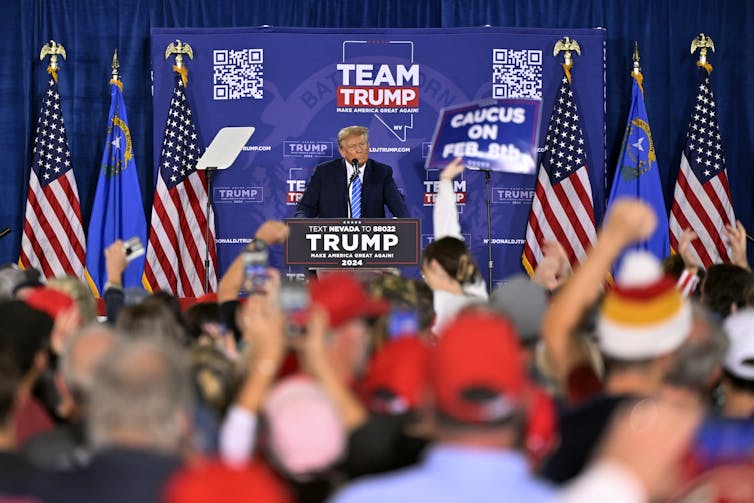
So you’re saying this actually isn’t a problem of federalism, it’s a problem created by a lack of clear understanding of this 14th Amendment provision?
Federalism is a way of thinking about the proper allocation of authority between the federal government and state governments. Federalism is not simply the idea that states get to do what they want.
Sometimes they can. But in other places the federal government has the final say, or the federal government is the one with the authority to make these determinations. And when it came to Section 3 of the 14th Amendment, when you have these messy, contested disputes, should this happen on a state-by-state basis?
The court seemed inclined to think that this is something better left to Congress, rather than states unilaterally interpreting Section 3 on their own.
So does that mean the court would like Congress to make things more clear?
Absolutely. Is it a dodge to say Congress needs to be responsible for this area? Yes. And you can look at Congress and say, have they really legislated in this area? Are they realistically going to legislate in this area? The answer is probably no. Congressional inaction means that these provisions are not going to be enforced, at least as they apply to the events of Jan. 6, 2021, for federal candidates.
How would a court decision affect states other than Colorado?
If the court issues a decision in the way it seems that it’s going to decide this case, it would prevent any states – at least in presidential elections – from keeping candidates off the primary or general election ballots under Section 3 of the 14th Amendment without some kind of federal guidance to get there.
That means there won’t be similar cases in other states, and the ones that are pending will be resolved in Trump’s favor. So I think this will be left to the political process. Trump will appear on the ballot, and the candidacies will proceed as if none of this had happened.
But does that then just kick a decision down the road, and Congress would have to decide after the election whether the president-elect – if Trump wins – is qualified to serve, a problem that the Colorado plaintiff’s lawyer said “could come back with a vengeance”?
Congress has the power to count electoral votes. In the past, it has rejected electoral votes, including in 1873 when a presidential candidate died. The worry here is that perhaps Congress would refuse to count electoral votes for a candidate who was an insurrectionist. And if that happens on Jan. 6, 2025, that puts the nation in a precarious place. Or if Trump takes office, there are likely to be many lawsuits to challenge his official actions by others who are saying he’s an insurrectionist who cannot hold office or act as president.
So a decision in the direction the court appears to be going in has the virtue of allowing the political process to play out. But it does leave open questions later about counting electoral votes or even serving in office, and open questions about mechanisms to challenge those actions and what they look like.![]()
Derek T. Muller, Professor of Law, University of Notre Dame
This article is republished from The Conversation under a Creative Commons license.
Wednesday, February 7, 2024
Calling all Alabama K-12 educators!
Saturday, February 3, 2024
Republicans and Democrats consider each other immoral – even when treated fairly and kindly by the opposition

Both Republicans and Democrats regarded people with opposing political views as less moral than people in their own party, even when their political opposites acted fairly or kindly toward them, according to experiments my colleagues and I recently conducted. Even participants who self-identified as only moderately conservative or liberal made the same harsh moral judgments about those on the other side of the political divide.
Psychology researcher Eli Finkel and his colleagues have suggested that moral judgment plays a major role in political polarization in the United States. My research team wondered if acts demonstrating good moral character could counteract partisan animosity. In other words, would you think more highly of someone who treated you well – regardless of their political leanings?
We decided to conduct an experiment based on game theory and turned to the Ultimatum Game, which researchers developed to study the role of fairness in cooperation. Psychology researcher Hanah Chapman and her colleagues have demonstrated that unfairness in the Ultimatum Game elicits moral disgust, making it a good tool for us to use to study moral judgment in real time.
The Ultimatum Game allowed us to experimentally manipulate whether partisans were treated unfairly, fairly or even kindly by political opponents. Participants had no knowledge about the person they were playing with beyond party affiliation and how they played the game.
In our experiments, even after fair or kind treatment, participants still rated political opponents as less moral. Moreover, this was true even for participants who didn’t consider themselves to have strong political bias.
Other psychology studies suggest that conservatives are more politically extreme, being more likely to adopt right-wing authoritarianism and more sensitive to moral disgust. However, in our experiments, we found no differences in party animosity and moral judgment between liberals and conservatives, suggesting political polarization is a bipartisan phenomenon.
Why it matters
Our experiments illustrate the magnitude of current political polarization in the United States, which has been increasing for at least the last four decades.
Americans with different political opinions could once cooperate and maintain friendships with one another. But as political attitudes begin to coincide with moral convictions, partisans increasingly view each other as immoral.
My colleagues and I are particularly interested in this topic, as we worry about the potential for political polarization based on moral convictions to descend into political violence.
What’s next
My colleagues and I believe that a controlled scientific approach, rather than speculation, could help find ways to mitigate political polarization. Currently, we are running experiments to explore how online interaction – for example, through social media – can foster psychological distance between partisans. We’re also investigating how emotions such as disgust can contribute to the moral component of partisan animosity, and how the evolutionary origins of morality may play a psychological role in political polarization.
The Research Brief is a short take on interesting academic work.![]()
Phillip McGarry, Ph.D. Candidate in Experimental Psychology, University of Tennessee
This article is republished from The Conversation under a Creative Commons license.
Friday, February 2, 2024
Wednesday, January 31, 2024
FRESH FRUIT AND VEGETABLE BENEFIT CARDS AVAILABLE FOR SENIORS
MONTGOMERY, Ala. – The Senior Farmers Market Nutrition Program (SFMNP) is a federally funded program administered by the Alabama Department of Agriculture and Industries’ Farmers Market Authority Section. The SFMNP provides eligible seniors with a $50 benefit card to purchase fresh fruits and vegetables from certified farmers at farmers markets and farm stands in the State of Alabama.
“The SFMNP card allows senior citizens to purchase more local products. I want to encourage those who are eligible to apply and begin shopping local,” said Commissioner of Agriculture and Industries Rick Pate. “ADAI looks forward to another year of supporting Alabama’s farmers and senior citizens through the Senior Farmers Market Nutrition Program.”
Eligibility:
Age — Must be 60 years of age or older on the day of application, AND
Income — Applicants’ gross household income must not exceed these limits:
- $2,248 monthly … for a household of … 1
- $3,041 monthly … for a household of … 2
Visit https://agi.alabama.gov/ or https://agi.alabama.gov/farmersmarket/ if there are more than two people in the household.
How to apply:
Applicants must apply online at https://agi.alabama.gov/farmersmarket/. Unfortunately, applications cannot be taken over the phone or by mail. If you have a benefit card from 2023, you will need your card number to renew that card and submit your application. If eligible and your application submission is completed, a benefit card will be mailed to the address provided on the application for new recipients. Applicants must reapply every year. However, it is important to keep the benefits card in a safe place, since new benefits will be loaded on the card each year after an application is received.
Where can I use the food benefits?
Benefits can be redeemed at State Sanctioned Farmers Markets, Farm Stands and U-Pick Operations for the purchase of fresh fruits, fresh vegetables, honey and cut herbs from May 1 through November 27, 2024. To view a list by county of locations that accept SFMNP benefit cards, visit https://agi.alabama.gov/farmersmarket/locations/. Benefits cannot be used at grocery stores or any location not listed on the redemption site.
How to use the benefit card:
When purchasing Alabama grown fresh fruits or vegetables from authorized farmers, present the benefit card just like you would a debit or credit card. The farmer will scan the card, enter the amount of the purchase, you will confirm the amount and then the purchase is complete. However, make sure the farmer returns your card to you. It is that simple!
For more information about the SFMNP, visit https://agi.alabama.gov/ or call 334-240-7247 or 1-877-774-9519.
Sunday, January 28, 2024
3 Ways to Support Veterans in Your Community
As a group, United States military veterans have played an important role in protecting the rights and freedoms enjoyed today. However, the sacrifices made by service members can become easy to overlook with the passage of time.
 For example, consider the experiences of Pfc. Antonio Ralph Martinez, one of 2,223 U.S. military servicemen aboard the Leopoldville, a Belgian transport ship. Ahead of the Battle of the Bulge, the last major German offensive of World War II, the Leopoldville was crossing the English Channel from England to France when a German U-boat struck it with a torpedo on Dec. 24, 1944.
For example, consider the experiences of Pfc. Antonio Ralph Martinez, one of 2,223 U.S. military servicemen aboard the Leopoldville, a Belgian transport ship. Ahead of the Battle of the Bulge, the last major German offensive of World War II, the Leopoldville was crossing the English Channel from England to France when a German U-boat struck it with a torpedo on Dec. 24, 1944.
In an interview for the Library of Congress Veterans History Project, Martinez recalled the ship zigzagging across the channel to dodge possible attacks. He was playing cards and jolted forward when the torpedo hit. Under blackout conditions, Martinez jumped to a nearby destroyer, sliding down a rope into the frigid water, where he stayed, developing hypothermia, until being rescued by a tugboat after about two hours.
Of those on board the Leopoldville, 515 are presumed to have gone down with the ship while another 248 died from injuries, drowning or hypothermia. Martinez was awarded a Bronze Star for his combat service during World War II and later served in the Air Force during the Korean War.
Stories like Martinez’s showcase the valor and sacrifice of veterans who deserve gratitude. Consider these three small gestures to help show appreciation to the veterans in your community as they reacclimate to civilian life following their service.
- Send a “Thank You” Card
Offering a heartfelt acknowledgment of the challenges veterans faced is one of the simplest ways to show them your appreciation and provide an emotional boost. If you know a veteran in your community, consider sending a handwritten “thank you” note. Or consult with a local veterans service organization that may be able to help you share a letter, card, care package or supportive email with former military personnel in your area.
- Encourage Veterans to Share Their Stories
The stories veterans carry with them are powerful and often help shape who they are. These stories can hold valuable lessons, details of accomplishments and battles won or memories of friendship and camaraderie. They can also serve as reminders of sacrifice and hardship.
Through the Veterans History Project, the Library of Congress collects and preserves the firsthand remembrances of U.S. military veterans like Martinez and makes them accessible. The project allows future generations to hear directly from veterans and better understand what they saw, did and felt during their service.
Participating in the program involves submitting a 30-minute (or longer) unedited video or audio interview sharing service details and/or a collection of original photographs or correspondence. Veterans, or families of deceased veterans on their behalf, may also submit a minimum 20-page journal or unpublished memoir and/or 10 or more original photos or letters. To get started, visit loc.gov/vets and click “How to Participate” to download a how-to field kit for details, instructions and required forms.
- Volunteer at Veterans Facilities or Organizations
Many veterans organizations, including Department of Veterans Affairs hospitals and medical facilities, welcome volunteers to assist with a variety of tasks such as clerical work, organization, transportation and simply visiting with wounded veterans to brighten their days. After locating a facility near you, contact the staff to arrange a visit and learn more about opportunities to volunteer your time and skills.
Library of Congress Veterans History Project
Saturday, January 27, 2024
Shelby County Democrats Announce 2024 Candidates
Democrats in Shelby County will see a large slate of candidates on next November’s general election ballot. Voters will see Democrats running for seven Shelby County Commission seats, one race featuring two Democrats who will face each other in the March 5, 2024 Democratic Primary. In November, more Dems will run for a Shelby County Board of Education seat and a District Court judge position, plus a Democrat will challenge the incumbent for Congress in District 6.
The qualified candidates and offices are:
US Congressional District 6 – Elizabeth Anderson
District Court Judge Place 2 – Ashley N. Bell
County Board of Education Place 1 – Julia Craig
County Commission 2 – Chris Nelson
County Commission 3 – Bobby Pierson
County Commission 4 – Phil Kirk
County Commission 5 – Leslie Tyus
County Commission 6 – Anondo Banerjee
County Commission 7 – Marsha S. Sturdevant
County Commission 7 – Spencer D. Stone
County Commission 8 – Jenice Prather-Kinsey
Interested Democrats who wish information about the candidates and the monthly meetings of the Shelby Democratic Party may inquire at shelbydem65@gmail.com.
Friday, January 19, 2024
Elizabeth Anderson for Congress
Monday, January 15, 2024
Ring The Bell!!!
Tuesday, December 5, 2023
Stanley Stoutamire, Jr.
Stanley Stoutamire, Jr., a resident of Calera and senior at John Carroll Catholic High School, spent March 4 – 11 in Washington D.C. as one of two delegates from Alabama to the U.S. Senate Youth Program. This prestigious program selects two outstanding young leaders from each state, plus the District of Columbia and the Department of Defense Schools. Selection for the program is based on leadership abilities, commitment to volunteer work, and academic achievement, along with recommendations from school officials.
Young Mr. Stoutamire was the guest speaker at a recent meeting of the Shelby County Democratic Party. With poise and eloquence unusual in someone still too young to vote, Stanley entertained an enthralled audience, in person and on Zoom, with his description of the arduous application and selection process, his whirlwind week of meetings with government officials, tours of government buildings and national monuments, plus becoming friends with other high school seniors from all over the country.
The most memorable public figures with whom he met were Senator John Hickenlooper and Justice Sonia Sotomayor, both of whom spoke in depth of their own paths toward a life of public service, and who encouraged the young leaders to embrace unexpected opportunities. Stanley and Ella Duus, the other Alabama delegate who is from Huntsville, were also scheduled to meet with Alabama’s senators; Senator Tuberville was in a meeting at the appointed time, but they enjoyed a lively conversation with the personable Senator Katie Britt.
Stanley Stoutamire, Jr. is now back at home in Calera, where he lives with proud parents Stanley, Sr. and Clarissa, with loads of photos and memories, and a renewed appreciation of the effort that goes into making government work for all Americans. Although his sights are set on medical school at this time, who knows what opportunities might arise for this talented, promising young man.
FOR IMMEDIATE RELEASE





